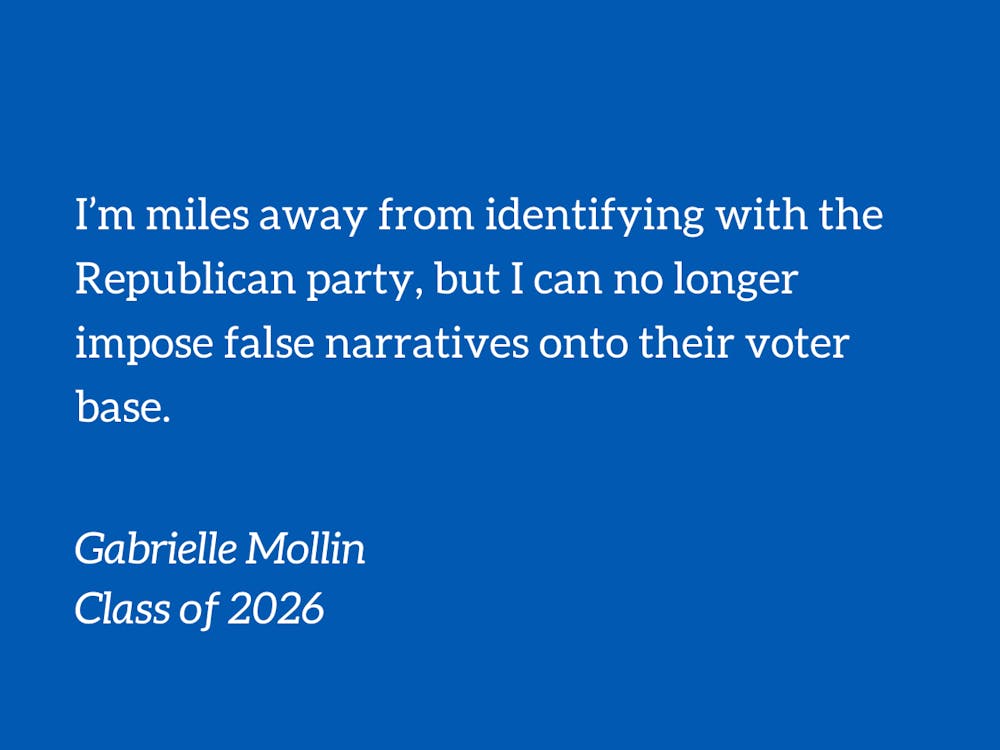As campus conversations begin to spiral about finding the right summer internship, I can’t help but think about my time last summer at DukeEngage’s Democracy at Risk program. Upon arriving in D.C., I had my work cut out for me. Our program’s goal of helping fix American democracy was lofty, and on top of that, I would be working for the “other side.” This Republican organization was committed to defeating Donald Trump in 2024, even if it meant turning against the majority of the Republican Party. Yet as I embarked on my internship at Longwell Partners, where I would devote hours a day filming testimonials with two-time Trump voters regarding their decision to move on from the indicted, impeached and immoral former president for the 2024 election, I often found myself wondering: how did our country get here?
In search of answers, I quickly found my way back to a trusty book from my political science class at the start of my first year at Duke that I’d brought along as a D.C. read (thanks Professor Vanberg). As I opened my heavily annotated copy of “How Democracies Die,” I slowly peeled off the first pink sticky note I saw and dove into the section on the “closet autocrat,” where I soon found some answers.
The “closet autocrat” bore all too many similarities to the man I’d spent my whole summer crusading against: Donald Trump. The chapter explained the nuances of outsider politicians — how they can rise to the top of a democratic institution with “rebel appeal” despite closeted disdain for democratic values.
As Donald Trump campaigned to label the media and political opponents as "terrorists," with which his followers swiftly agreed, it became easier for him to justify actions against such groups and our democracy as he took the White House and fought back against leaving it. Even further, because Trump’s claim to fame deepened our culture of polarization and hostility, his words had a “boomerang effect.” Threatened, the media ditched restraint and professionalism in an attempt to undermine the government. Embattled, political opponents ditched restraint and professionalism in an attempt to undermine the government. The very people and institutions Trump baselessly condemned turned into what his voters feared most.
So it seems Trump invented a democratic crisis to get elected, but then he created that very crisis by stoking fear throughout his base. And when people are afraid, it’s easier for them to support quasi-authoritarian expansions of executive power (look at public favor for the USA PATRIOT Act after 9/11 or for Japanese internment camps during WW2). When these crises are invented by demonizing political rivals, thereby furthering polarization, politicians like Trump may feel justified to employ any means necessary to defeat opponents. And even if such actions are antidemocratic, citizens support them because they too fear the opponent.
But while Trump poses a definitive threat to our democracy, his power came from a fault within our political system: people don't feel represented by their government. On nearly every testimonial call I had while interning at Longwell, two-time Trump voters cite Trump’s business skills and real-life experience as his primary appeal in 2016. Though they grew to resent his narcissism and vindictive rhetoric, Trump’s uninhibited politics managed to break down the barrier between most everyday Americans and the political sphere. So while Trump arguably embodies patient zero for the deep polarization that infects American society, he also signals a yearning within the American public for their politicians to fulfill Lincoln’s famed national promise of “government of the people, for the people, and by the people.”
The Republican firm I worked at knew where our democracy was headed with Trump, and like me, they wanted to change it. My friends jeered at me, a left-leaning New Yorker, spending eight weeks in a D.C. office with a bunch of Republicans. I laughed along, but after some time I didn’t find their jokes all that funny. Republican or not, the people at Longwell were committed to our democracy. They were committed to defending their party from Donald Trump. And they were committed to including me in the process, even though they knew I belonged to a different side of the political spectrum. What good was it to laugh at this group who had only been honorable in my eyes?
Now I’m no democracy expert, but I do know people. I know how easy it is to judge, to criticize, to laugh. I know it’s tempting to write off your political opponents when you’ve never even spoken to them, fomenting caricatures of uninformed bigots. I used to do that. But after talking with Stephen from South Carolina, Ross from Utah, Joanna from Tennessee and many more two-time Trump voters around the country who are now committed to his exile from the Republican party, I came to see our country in a new light.
I’m miles away from identifying with the Republican party, but I can no longer impose false narratives onto their voter base. And even though I never fully agreed with these people, I came to understand them. They were scared. They were angry. They were isolated. They wanted change. And I want change for them. We cannot continue to exclude them from our political future; that’s why we are where we are today. Continued isolation will only bring about more polarization, which will only further damage our democracy. We should know better by now.
So instead of sticking with people who think like me, comfortably yet critically looking down at the “other,” I spent my summer in deep conversation with fellow Americans whom I once foolishly perceived as the enemy, working together towards a common cause many want to claim as their own. And now, I’m urging you to try something like it … you might be surprised.
Gabrielle Mollin is a Trinity sophomore. Her column typically runs on alternate Thursdays.
Get The Chronicle straight to your inbox
Signup for our weekly newsletter. Cancel at any time.

